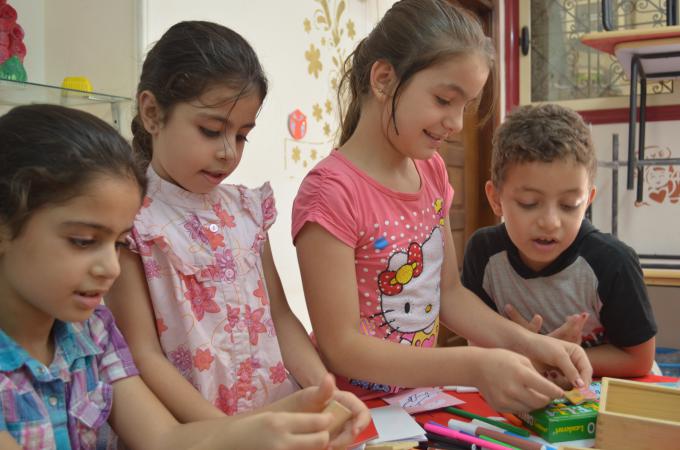Sharing Humanity on World Humanitarian Day
To commemorate World Humanitarian Day on 19 August 2015, Save the Children is telling the stories of some of the inspiring aid workers that have dedicated their lives to humanitarian work. Hala* is a Syrian refugee from Aleppo who now lives in Obour, Greater Cairo. She works as a facilitator at a Child and Family Centre run by Save the Children with funding from UNHCR, providing recreational activities and emotional support for Egyptian and refugee children. Hala always had an instinct that her calling in life would be to do humanitarian work. When she was at university in Aleppo, before the Syria conflict started, she used to volunteer at the Red Crescent. Once the war started she would go to schools sheltering displaced people and distribute food for them. When she moved to Egypt she decided to work with Save the Children at the Obour Child and Family Centre, where she leads psychosocial and recreational activities for children.
Hala*’s story in her own words:
On doing humanitarian work
“I had a calling to do humanitarian work from a young age. While I was still at university in Syria, before the war started, I used to volunteer with the Red Crescent at homes for elderly people and also with orphans. I used to do psychosocial activities with children who had been through difficult experiences to help them to overcome their difficulties. I just wanted to be an active citizen, I would do things like painting pavements and anything that involved public service. It used to give me happiness to clean the streets or my university. After university I got married and moved to Algeria with my husband. Once the war started we returned to Syria and lived there for one year. During that year I had my baby girl.
When we returned to Syria I knew I had to do something to help. Before the war it was about doing volunteer work but after the war it became obligatory because I had a strong inner conviction to do it. My conscience told me I had to do it. I wanted to play my part to help my people and so I used to go to schools which were providing shelter for people who had been forced to leave their homes and I would distribute food for them. Then the bombs started exploding in random areas and my husband became afraid something would happen to me, so we decided to come to Egypt.
We left our country because we had no choice. We left our families behind there. Syrian children have not had a childhood. My daughter is being raised here far away from her extended family. She doesn’t even know who they are. When we first arrived in Egypt my main purpose was to make sure my daughter was ok but whenever I met another Syrian child I remembered all the suffering that I went through. I had to do something to help. So I decided to work at a Syrian community school and another organisation that works with Syrian refugee children. Then I heard about Save the Children and so I applied. At first the only position available involved accompanying children on the bus to go to their activities. I took the post but deep down I knew that I wanted to be able to use my experience and my skills in providing emotional support for children. Soon it started naturally happening on the bus. While chatting to the children I would learn what they were going through psychologically and we would end up doing activities on the bus to help them release some of their tension. I soon started working doing recreational and psychosocial activities with children.
Seeing these children laugh after everything they have been through is the most rewarding thing about my work. Although I know that behind their smiles is a lot of suffering. If you ask these children “What are the things that make you most happy in life?” some of them will say things like “The happiest moment in my life was when my dad was freed from detention.” Some children have seen their parents dying in front of their eyes. I had a child who arrived in the class with burns all over his face caused by an explosion. When children first arrive from Syria in their art classes they draw pictures of tanks and blood. That’s how I felt when I first got here too because these were the most fresh images in my mind. When these children are coming here from the same country you are from and you can relate to their feelings and experiences you cannot help but want to help them, and give them everything you possibly can. When I first came to Egypt I had many psychological problems caused by what I had witnessed in Syria but once I started working with children I felt so much better.
These are innocent children who should not have seen what they have seen. With my daughter I try as much as possible not to let her see violent things on the TV but these children have actually seen it all live! I swear, even if I don’t get any money it’s enough for me to see them laughing and smiling and to go back to being strong. To be able to build their country again. The children are so innocent. They are giving me strength to give them hope. And for me when a child starts to draw flowers instead of blood and tanks that means that I have done something. I’ve made a change. And that is my main mission in life.”
 Egypt
Egypt 